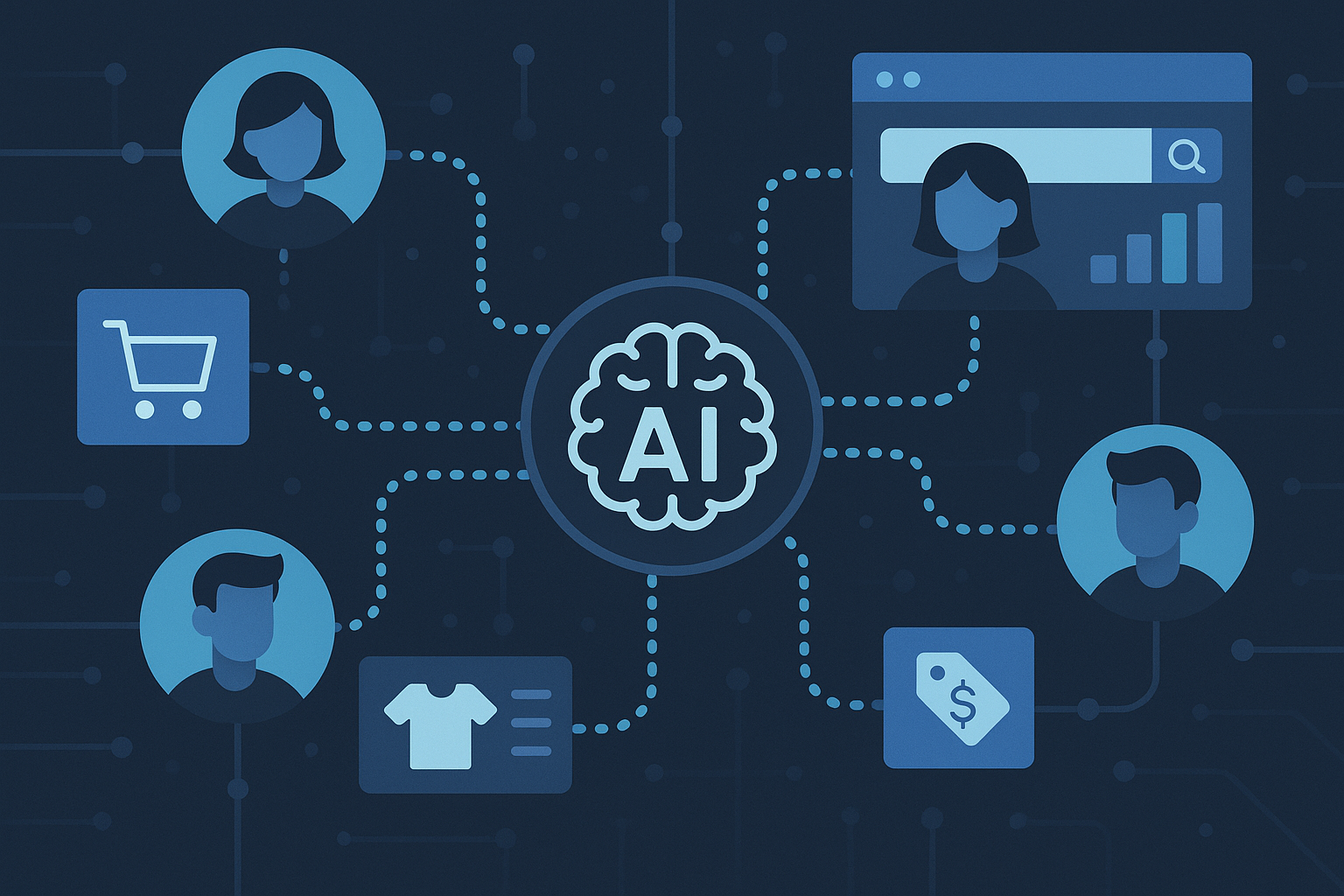Artificial Intelligence (AI) is revolutionizing online shops and e-commerce by automating complex workflows, enhancing user experiences, and boosting efficiency. ASSISTIO, leveraging agentic workflows, exemplifies this integration, orchestrating intelligent processes that transform digital commerce operations. This article explores how these technologies converge to reshape the future of e-commerce.
Understanding Artificial Intelligence in E-Commerce
Artificial Intelligence (AI) forms the backbone of modern e-commerce innovation, reshaping how online shops engage with customers and optimize their operations. At its core, AI encompasses systems and algorithms capable of *learning* from data, *reasoning* to interpret complex inputs, and *making decisions* based on patterns and predictive insights. These capabilities empower e-commerce platforms to transcend static user experiences and evolve dynamically with each interaction.
In online shops, AI’s learning capability manifests through continual analysis of vast datasets – including browsing behavior, purchase histories, and user feedback – enabling personalized recommendations that anticipate customers’ needs. Recommendation systems, for instance, utilize machine learning models to identify products aligned with individual preferences, significantly boosting conversion rates by offering targeted suggestions. Unlike one-size-fits-all marketing, this personalization increases relevance, customer satisfaction, and ultimately, sales volume.
Reasoning abilities of AI also facilitate advanced customer service through virtual assistants and chatbots. These AI agents interpret natural language inputs, respond accurately to inquiries, and even detect sentiment, providing real-time support without human intervention. Within e-commerce, this reduces response times, addresses user frustrations promptly, and maintains a seamless shopping journey, all while gathering data on common pain points that further enhance service quality.
Decision-making AI powers inventory management, dynamic pricing strategies, and fraud detection. For example, predictive algorithms forecast demand fluctuations and automate stock replenishment to prevent outages or overstocking. Dynamic pricing models adjust product costs in real-time based on market trends and competitor analysis, maximizing profitability without alienating customers. AI-driven fraud detection scrutinizes transaction patterns to flag suspicious activities swiftly, safeguarding both merchants and shoppers.
The integration of these AI applications within platforms like ASSISTIO harnesses agentic workflows, orchestrating the complex interplay between automated AI functions and human oversight. By embedding AI into everyday e-commerce operations, online shops evolve from reactive to proactive entities, delivering personalized, efficient, and secure experiences that align precisely with customer behavior and business objectives. This transformation not only enhances customer engagement but creates scalable growth opportunities in an increasingly competitive digital marketplace.
Exploring Agentic Workflow for Streamlined Operations
Agentic workflow represents an advanced framework for synchronizing both automated and human-driven activities in e-commerce environments, fostering smoother, more adaptive operational flows. At its core, agentic workflow is a systematic orchestration model where intelligent software agents take on active roles—not merely executing pre-programmed tasks but autonomously coordinating sequences, managing interactions, and soliciting human input when necessary. This hybrid collaboration blurs the traditional boundaries between automation and human oversight, allowing workflows to evolve dynamically in response to context and exceptions.
Key principles of agentic workflow include autonomy, adaptability, and collaboration. Autonomy enables system agents to initiate, monitor, and adjust tasks without constant human supervision, while adaptability lets these agents respond to real-time data, such as fluctuating inventory or customer inquiries. Collaboration ensures seamless transitions between AI agents and human operators, wherein agents recognize when to request approvals or escalate decisions to maximize process accuracy and compliance.
In the realm of online shops, agentic workflows fundamentally enhance operational efficiency by orchestrating complex interactions among order fulfillment, inventory control, payment verification, and customer service processes. By autonomously sequencing these activities and triggering the right human interventions at precise moments, agentic workflows prevent procedural bottlenecks that typically arise from manual handoffs or rigid automation. For example, when suspicious payment activity is detected, an agent can automatically pause order processing and route a detailed alert to fraud analysts, who then quickly assess and authorize next steps without stalling the entire shipment pipeline. Similarly, during peak shopping periods, agentic agents can dynamically reprioritize support tickets or automate status updates, minimizing customer wait times while reducing manual workload.
This smart coordination also scales gracefully as online shops grow. Instead of linearly increasing staff or workflow complexity, agentic workflows enable e-commerce platforms to absorb higher volumes through self-optimizing task management — intelligently distributing workloads, anticipating resource shortages, and initiating contingency measures. For instance, if a product suddenly spikes in demand, agents can proactively request inventory replenishments or suggest alternative items to customers, reducing lost sales opportunities.
By embracing agentic workflows, e-commerce operations gain resilience and flexibility that traditional fixed processes lack. The integration of autonomous decision-making with human judgment ensures responsiveness to unpredictable market conditions while maintaining control and accuracy. Consequently, agentic workflows serve as a critical foundation for next-generation online shops seeking sustained efficiency and customer satisfaction in an increasingly competitive digital marketplace.
ASSISTIO as a Catalyst for Intelligent Workflow Automation
ASSISTIO stands at the forefront of intelligent workflow automation by seamlessly integrating advanced artificial intelligence with agentic workflow methodologies to elevate e-commerce operations to new levels of agility and precision. This platform is designed to address the growing complexity inherent in running online shops and expansive e-commerce networks, where rapid decision-making and dynamic task management are crucial. At its core, ASSISTIO harnesses AI algorithms that not only interpret and respond to real-time data but also delegate responsibilities intelligently among both human agents and automated systems, creating a responsive ecosystem that adapts fluidly to changing demands.
Key features of ASSISTIO include intelligent task delegation, which assigns responsibilities based on the nature and urgency of the task, as well as the current workload and expertise of available resources. This ensures that routine, repetitive tasks such as order confirmation or invoice generation are handled autonomously, while more complex issues—like customer disputes or supply chain disruptions—are escalated to appropriate human decision-makers supported by AI-generated insights. Real-time process monitoring is another cornerstone, enabling supervisors and AI agents to track workflow progress continuously, identify bottlenecks immediately, and implement corrective measures without delay. This monitoring extends across multiple channels, from inventory fluctuations and shipment statuses to customer inquiry response times, thus maintaining a consistent, high-efficiency operation.
Additionally, ASSISTIO incorporates adaptive decision-making mechanisms driven by machine learning models that evolve based on historical data and emerging patterns. For online shops, this translates into optimized inventory management by anticipating demand shifts and automating reorder triggers that prevent stockouts or overstock situations. In order processing, ASSISTIO streamlines the entire lifecycle—from payment verification to logistics coordination—reducing manual interventions and accelerating delivery timelines. Its customer service modules employ natural language processing to interpret inquiries and provide instant, context-aware responses, while seamlessly escalating unresolved issues for human follow-up. By embedding these intelligent capabilities, ASSISTIO transforms e-commerce platforms into self-regulating entities that dynamically balance operational objectives with customer satisfaction imperatives, significantly enhancing scalability and responsiveness in an increasingly competitive marketplace.
The Future of Online Shopping and E-Commerce with AI Innovations
The rapid integration of AI into online shopping is reshaping e-commerce far beyond traditional automation, driven by innovative platforms like ASSISTIO that enable highly agentic workflows. At the core of this transformation is an unprecedented ability to personalize shopping experiences, making each interaction uniquely tailored to individual customer preferences and behaviors. Through deep learning algorithms and real-time data analysis, AI systems can anticipate needs, suggest complementary products, and even dynamically adjust pricing or promotions. This level of personalization is moving towards hyper-relevance, reducing friction and significantly boosting conversion rates.
In tandem with personalization, the evolution of omnichannel experiences is accelerating. Modern consumers expect seamless transitions between mobile apps, web storefronts, physical locations, and even voice-enabled devices. AI-powered workflows orchestrate these touchpoints effortlessly, ensuring inventory synchronization, consistent customer data, and context-aware interactions regardless of channel. ASSISTIO’s agentic capabilities support this by autonomously managing complex multi-channel processes — for example, initiating returns in-store while updating online inventory or enabling AI-guided customer service bots to pick up unresolved queries from previous interactions without forcing customers to repeat themselves.
Automation is scaling new heights as AI transcends simple rule-based systems. Intelligent agents not only execute predefined tasks but also learn from outcomes and collaboratively optimize workflows across departments like marketing, supply chain, and customer support. This adaptive intelligence enhances operational efficiency and responsiveness in unprecedented ways, freeing human teams for higher-value strategic work.
Yet, these advancements raise critical challenges. The extensive use of sensitive personal data necessitates stringent privacy safeguards and transparent data governance models to maintain consumer trust. Cybersecurity must evolve to counter increasingly sophisticated threats targeting AI-driven infrastructures. Additionally, balancing automation with human oversight is vital to preventing algorithmic biases and ensuring ethical use.
Ultimately, the blending of AI innovations and agentic workflow platforms like ASSISTIO heralds a new era for online shops and e-commerce. This era is marked by smarter, more efficient, and deeply customer-centric digital commerce ecosystems that continuously adapt and improve, promising to redefine how consumers engage with brands and products worldwide.
Conclusions
AI and agentic workflows, exemplified by platforms like ASSISTIO, are fundamentally transforming e-commerce by automating complex operations and enhancing customer experiences. This synergy enables online shops to operate more efficiently and effectively in a competitive landscape. As technology evolves, embracing these innovations will be key for businesses aiming to thrive in the modern digital marketplace.


Leave a Reply